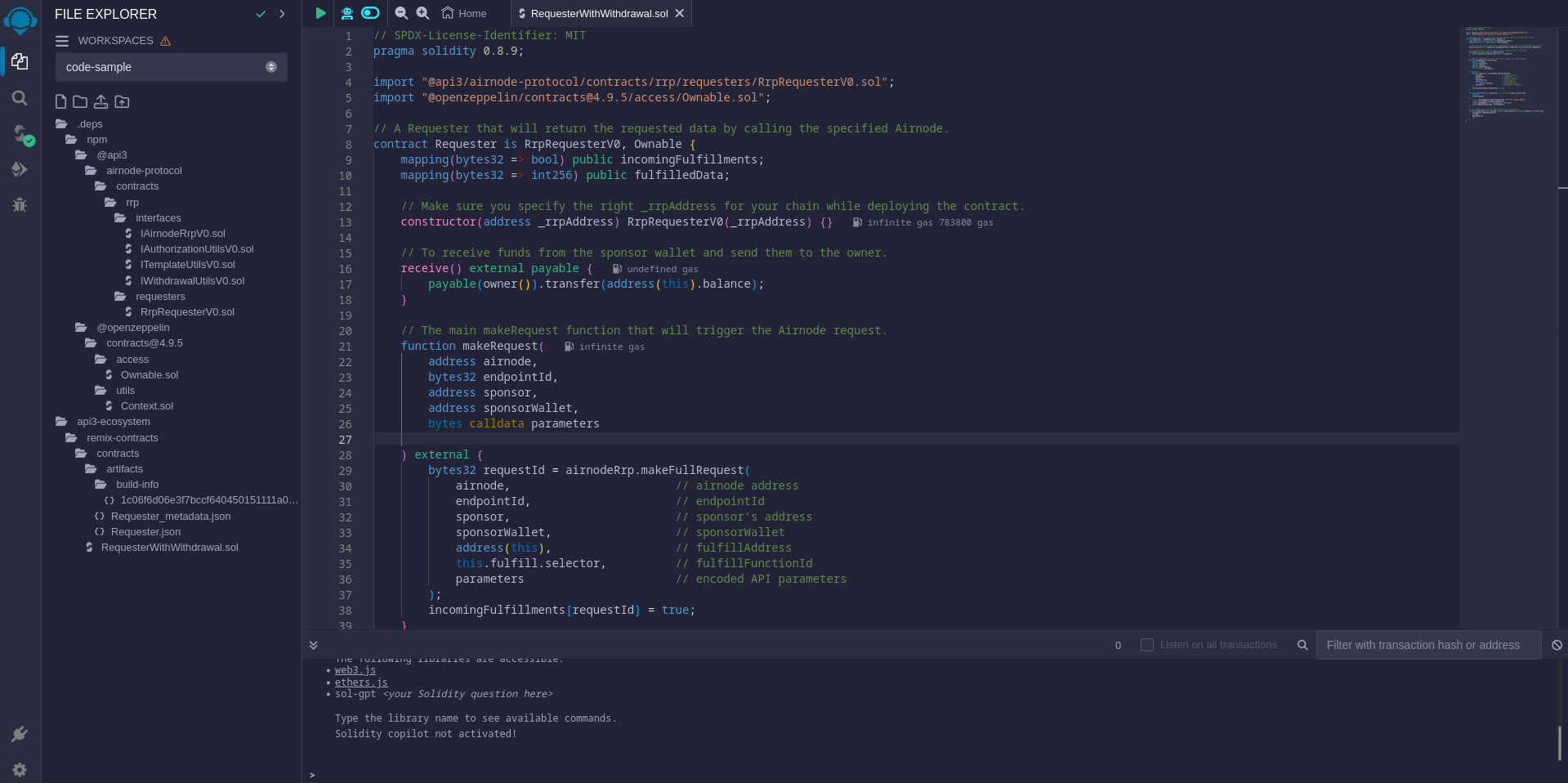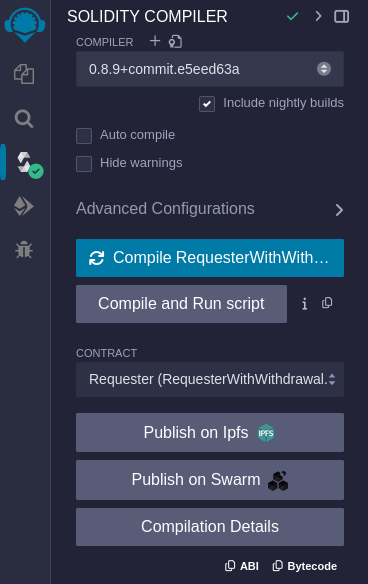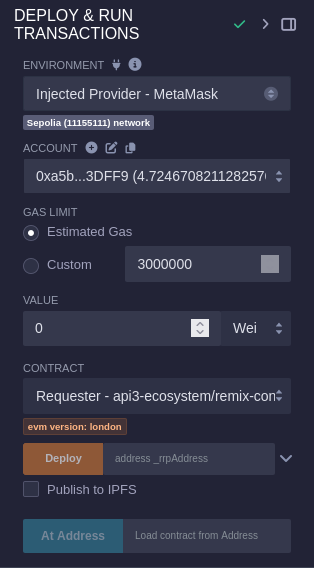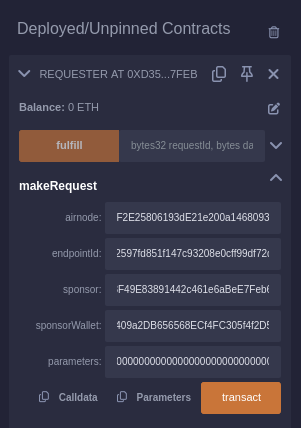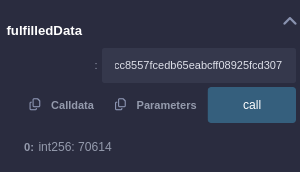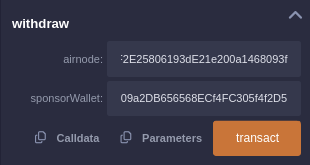 Guides → Calling an Airnode
Guides → Calling an AirnodeCalling an Airnode
Introduction
Airnodes are first-party oracles that are directly operated by the API Providers that provide data to any on-chain dApp. The Smart Contracts can request data from the Airnodes without going through any intermediary.
This guide shows you how to code, deploy, and run a simple smart contract that requests data from an Airnode, via the Request Response Protocol.
1. Coding the Requester Contract
Check your Network!
Make sure you're on a Ethereum Sepolia testnet before trying to deploy the contracts on-chain!
Given below is an example of a basic Requester Contract to request data from any Airnode. To follow along, you can open the following contract in Remix and try deploying your own Requester Contract.
In this example, you will be calling the Coingecko Airnode to request the latest price of an asset on Ethereum Sepolia.
// SPDX-License-Identifier: MIT
pragma solidity 0.8.9;
import "@api3/airnode-protocol/contracts/rrp/requesters/RrpRequesterV0.sol";
import "@openzeppelin/contracts@4.9.5/access/Ownable.sol";
// A Requester that will return the requested data by calling the specified Airnode.
contract Requester is RrpRequesterV0, Ownable {
mapping(bytes32 => bool) public incomingFulfillments;
mapping(bytes32 => int256) public fulfilledData;
// Make sure you specify the right _rrpAddress for your chain while deploying the contract.
constructor(address _rrpAddress) RrpRequesterV0(_rrpAddress) {}
// To receive funds from the sponsor wallet and send them to the owner.
receive() external payable {
payable(owner()).transfer(address(this).balance);
}
// The main makeRequest function that will trigger the Airnode request.
function makeRequest(
address airnode,
bytes32 endpointId,
address sponsor,
address sponsorWallet,
bytes calldata parameters
) external {
bytes32 requestId = airnodeRrp.makeFullRequest(
airnode, // airnode address
endpointId, // endpointId
sponsor, // sponsor's address
sponsorWallet, // sponsorWallet
address(this), // fulfillAddress
this.fulfill.selector, // fulfillFunctionId
parameters // encoded API parameters
);
incomingFulfillments[requestId] = true;
}
function fulfill(bytes32 requestId, bytes calldata data)
external
onlyAirnodeRrp
{
require(incomingFulfillments[requestId], "No such request made");
delete incomingFulfillments[requestId];
int256 decodedData = abi.decode(data, (int256));
fulfilledData[requestId] = decodedData;
}
// To withdraw funds from the sponsor wallet to the contract.
function withdraw(address airnode, address sponsorWallet) external onlyOwner {
airnodeRrp.requestWithdrawal(airnode, sponsorWallet);
}
}2
3
4
5
6
7
8
9
10
11
12
13
14
15
16
17
18
19
20
21
22
23
24
25
26
27
28
29
30
31
32
33
34
35
36
37
38
39
40
41
42
43
44
45
46
47
48
49
50
51
52
53
54
55
Request Parameters
A full request using the AirnodeRrpV0.sol contract's makeFullRequest function requires all parameters needed by the Airnode application to be passed at runtime.
function makeRequest(
address airnode,
bytes32 endpointId,
address sponsor,
address sponsorWallet,
bytes calldata parameters
) external {
bytes32 requestId = airnodeRrp.makeFullRequest(
airnode, // airnode
endpointId, // endpointId
sponsor, // sponsor's address
sponsorWallet, // sponsorWallet
address(this), // fulfillAddress
this.fulfill.selector, // fulfillFunctionId
parameters // encoded API parameters
);
incomingFulfillments[requestId] = true;
}2
3
4
5
6
7
8
9
10
11
12
13
14
15
16
17
18
19
Since the makeRequest function makes a full request, it needs the following parameters to pass on to airnodeRrp.makeFullRequest.
airnodeandendpointId: As a pair, these uniquely identify the endpoint desired at a particular Airnode.sponsor: The sponsor address.sponsorWallet: The sponsor wallet address that the sponsor derived using the Airnode's address and extended public key.fulfillAddressandfulfillFunctionId: The public address of your requester contract and its function that is called upon the return of the request.parameters: Specify the API parameters and any reserved parameters, these must be encoded. See Airnode ABI specifications for how these are encoded. In most, cases theparametersare encoded off-chain and passed to the requester which only forwards them. You can use the@api3/airnode-abipackage to perform the encoding and decoding.
Response Parameters
The callback to a requester contains two parameters, as shown in the fulfill function in the code sample below.
function fulfill(bytes32 requestId, bytes calldata data)
external
onlyAirnodeRrp
{
require(incomingFulfillments[requestId], "No such request made");
delete incomingFulfillments[requestId];
int256 decodedData = abi.decode(data, (int256));
fulfilledData[requestId] = decodedData;
}2
3
4
5
6
7
8
9
10
requestId: First acquired when making the request and passed here as a reference to identify the request for which the response is intended.data: In case of a successful response, this is the requested data which has been encoded and contains a timestamp in addition to other response data. Decode it using the function decode() from the abi object.
Withdrawal
The withdraw() function is used to withdraw funds from the designated sponsor wallet to the sponsor. In this case, we're using the RrpRequesterV0 for which the sponsor is the Requester contract itself.
It calls the requestWithdrawal function of the airnodeRrp contract.
airnode: The address of the Airnode.sponsorWallet: The address of the sponsor wallet.
2. Deploying and Sponsoring the Requester
Set up your Testnet Metamask Account!
Make sure you've already configured your Metamask wallet and funded it with some testnet Sepolia ETH before moving forward. You can request some from here
You now need to deploy the Requester Contract and call it through Remix. It will be calling the Coingecko Airnode to request the latest price of Bitcoin on Ethereum Sepolia testnet.
Compile and Deploy the Requester Contract on Sepolia Testnet
- Click here to open the Requester Contract in Remix.
- Click on the COMPILE tab on the left side of the dashboard and click on Compile Requester.sol
Head to Deploy and run Transactions and select Injected Provider — MetaMask option under Environment. Connect your MetaMask. Make sure you’re on the Sepolia Testnet.
The
_rrpAddressis the mainairnodeRrpAddress. The RRP Contracts have already been deployed on-chain. You can check for your specific chain here. Fill it in and Deploy the Contract.
Sponsor the Requester
The Sponsor Wallet needs to be derived from the requester's contract address, the Airnode address, and the Airnode xpub. The wallet is used to pay gas costs of the transactions. The sponsor wallet must be derived using the command derive-sponsor-wallet-address from the Admin CLI. Use the value of the sponsor wallet address that the command outputs while making the request. This wallet needs to be funded.
Coingecko's Airnode Details on Sepolia Testnet
Coingecko's Airnode Address = 0x5231b5b98A43F2E25806193dE21e200a1468093f
Coingecko's Airnode XPUB = xpub6Ce9SBpTarEP5BZV5qH8ZfQjLmwfJT2SZQMKAtkV2F3cj1zXB8pUzpDa3RpDuT2xHAwQ2v7vtkPeMargby67NVNCtEBzRNvdAi4Z5yaHhUC
Coingecko's Endpoint ID (`/simple/price`) = 0x5dbf4e8c53ad4ffdec277ec4df847e6272597fd851f147c93208e0cff99df72d2
3
npx @api3/airnode-admin derive-sponsor-wallet-address \
--airnode-xpub xpub6Ce9SBpTarEP5BZV5qH8ZfQjLmwfJT2SZQMKAtkV2F3cj1zXB8pUzpDa3RpDuT2xHAwQ2v7vtkPeMargby67NVNCtEBzRNvdAi4Z5yaHhUC \
--airnode-address 0x5231b5b98A43F2E25806193dE21e200a1468093f \
--sponsor-address <Use the address of your Deployed Requester>
Sponsor wallet address: 0x6394...5906757
# Use the above address from your command execution as the value for sponsorWallet.2
3
4
5
6
7
Designated Sponsor Wallets
Sponsors should not fund a sponsorWallet with more than they can trust the Airnode with, as the Airnode controls the private key to the sponsorWallet. The deployer of such Airnode undertakes no custody obligations, and the risk of loss or misuse of any excess funds sent to the sponsorWallet remains with the sponsor.
Encoding parameters
parameters specify the API and Reserved Parameters (see Airnode ABI specifications for how these are encoded). The parameters are required to be encoded in bytes32 before you send it. Use the @api3/airnode-abi library to encode the parameters off-chain and then send it to the Requester.
You can encode your API Parameters off-chain using the following code snippet.
const { encode } = require('@api3/airnode-abi');
const { decode } = require('@api3/airnode-abi');
// Add your parameters here, then copy the encoded data to be used as parameters in the makeRequest function.
const params = [
{ type: 'string', name: 'vs_currencies', value: 'usd' },
{ type: 'string', name: 'ids', value: 'bitcoin' },
{ type: 'string', name: '_path', value: 'bitcoin.usd' },
{ type: 'string', name: '_type', value: 'int256' },
];
const encodedData = encode(params);
const decodedData = decode(encodedData);
console.log(encodedData);
console.log(decodedData);2
3
4
5
6
7
8
9
10
11
12
13
14
15
16
It should output the encoded parameters. If you want, you can copy the encoded parameters directly from here: (0x3...000→ ❏ )
3. Making the Request
Head over to the Deploy & run transactions tab, click on the contract dropdown and select Requester.sol
Now select the makeRequest dropdown to see all the parameters you need to pass in order to make a full request to the Airnode. Populate all the fields and click on Transact.
Head over to Sepolia Testnet Explorer and check your sponsorWallet for any new transactions.
Here, you can see the latest Fulfill transaction.
You might need to wait for a minute or two
The Airnode calls the fulfill() function in AirnodeRrpV0.sol that will in turn call back the requester contract at fulfillAddress using function fulfillFunctionId to deliver data.
Now go back on Remix and check for requestId under logs for the latest transaction.
Copy your requestId and paste it under the fulfilledData method to decode the response. Click on call and you will see the API response. Here, you can see your requested data decoded in int256
4. Withdrawing Funds from the sponsorWallet (optional)
You can withdraw funds from the sponsor wallet to address of the owner by calling the withdraw() function.
The Airnode listens for withdrawal requests and fulfills them automatically. Therefore, the Requester contract makes a request for withdrawal to the Airnode. The Airnode then fulfills the request, calls the receive() function in the Requester contract, that sends the funds back to the owner.
receive() external payable {
payable(owner()).transfer(address(this).balance);
}2
3
The sponsorWallet does not get deleted, and can be used in the future simply by funding it again.
Simply pass in the airnode and the sponsorWallet address and click transact. Confirm the transaction on Metamask.
Click here to read more about how sponsors, requesters and withdrawals work
Now wait for the Airnode to fulfill the withdrawal request. You can check the sponsor wallet for any new transactions.
The funds from the sponsorWallet have been transferred to the owner.
5. Using HTTP Gateways (optional)
You can use HTTP Gateways to make requests to the Airnode off-chain. HTTP Gateways are usually used to test and ensure if the Airnode is configured properly and working as expected without having the need to make a request on-chain.
Read more about HTTP Gateways here.
Once you deploy an Airnode, the HTTP Gateway and the HTTP Signed data Gateway URLs are displayed on the terminal at the end of the deployment process. You can use these URLs to make HTTP requests to the Airnode.
For this example, we are going to use the Coingecko's Airnode HTTP Gateway URL to to make a request to the Airnode. You can use a tool like Postman or CURL to make a POST request.
To make a request for the HTTP Gateway, you need to make a POST request to the HTTP Gateway URL followed by the endpoint ID along with the following parameters defined in the request body.
curl \
-X POST \
-H 'Content-Type: application/json' \
-d '{"parameters": {"vs_currencies": "usd", "ids": "bitcoin"}}' \
'https://v5smo0rs75.execute-api.us-east-1.amazonaws.com/v1/d8c1ffa0-6e08-a88c-c999-a31f2acc2c22/0x5dbf4e8c53ad4ffdec277ec4df847e6272597fd851f147c93208e0cff99df72d'2
3
4
5
Similarly, for a HTTP Signed data Gateway request, you need to pass in the encoded parameters defined as encodedParameters in the request body. You can use the @api3/airnode-abi library to encode the parameters like previously shown.
curl \
-X POST \
-H 'Content-Type: application/json' \
-d '{"encodedParameters": "0x315353535300000000000000000000000000000000000000000000000000000076735f63757272656e63696573000000000000000000000000000000000000000000000000000000000000000000000000000000000000000000000000000120696473000000000000000000000000000000000000000000000000000000000000000000000000000000000000000000000000000000000000000000000001605f7061746800000000000000000000000000000000000000000000000000000000000000000000000000000000000000000000000000000000000000000001a05f7479706500000000000000000000000000000000000000000000000000000000000000000000000000000000000000000000000000000000000000000001e0000000000000000000000000000000000000000000000000000000000000000375736400000000000000000000000000000000000000000000000000000000000000000000000000000000000000000000000000000000000000000000000007626974636f696e00000000000000000000000000000000000000000000000000000000000000000000000000000000000000000000000000000000000000000b626974636f696e2e7573640000000000000000000000000000000000000000000000000000000000000000000000000000000000000000000000000000000006696e743235360000000000000000000000000000000000000000000000000000"}' \
'https://p9a26cqzo9.execute-api.us-east-1.amazonaws.com/v1/1f5dddde-02c6-2712-b941-2ec24f0113dc/0x5dbf4e8c53ad4ffdec277ec4df847e6272597fd851f147c93208e0cff99df72d'2
3
4
5



